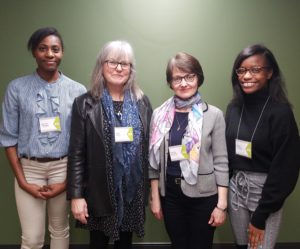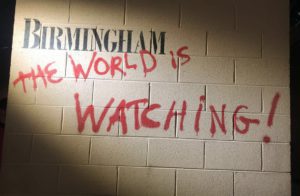Richard Wright Center (RWC) tutors Natasha Arrington and Mariah Christian presented at the conference of the Southeastern Writing Center Association (SWCA) that was held February 20–22 at the University of Alabama-Birmingham.
 Together with Dr. Kathi Griffin, RWC Director, and Dr. Tatiana Glushko, RWC Coordinator, they presented on “Replicating a Student-Led Writing Center Study at an HBCU,” describing the center’s research project to understand student perceptions of the writing center and sharing how their understanding of research has begun to deepen.
Together with Dr. Kathi Griffin, RWC Director, and Dr. Tatiana Glushko, RWC Coordinator, they presented on “Replicating a Student-Led Writing Center Study at an HBCU,” describing the center’s research project to understand student perceptions of the writing center and sharing how their understanding of research has begun to deepen.
RWC tutors are conducting this research project as part of their coursework in ENG 311: Issues in Tutoring Writing. The project replicates studies conducted at other institutions—a PWI and a community college—thereby contributing to research on writing center pedagogy by including HBCUs, like JSU, in the national conversation in the field of writing studies. In the field, a call for replicable, aggregable, data-driven (RAD) studies spurred us, first, to design our own RAD project and then, this year, to replicate a study we thought would help us understand how our writing center is perceived on our campus.
For Natasha and Mariah, presenting at SWCA was a valuable, and enjoyable, experience:
Mariah Christian, Psychology (sophomore)
At the SWCA conference, I was given the opportunity to present on why I thought HBCUs deserve to have a voice when it comes to research about students’ perception of the writing center. I was nervous when presenting because I am not comfortable speaking in front of a crowd of people. However, I know that doing this is preparing me to be able to comfortably speak in front of a large group of people. Also, the feedback that I received from other tutors and writing center directors from across the region was very informative and helpful. It’s nice to know that there are other tutors who struggle with their writing center being viewed as “bougie.”
 I also had the opportunity to visit the Birmingham Civil Rights Institute, so I can now compare the civil rights museums in Memphis, TN, Jackson, MS, and Birmingham, AL. Seeing how far African Americans have come and still how far we have to go is inspiring. I learned that Birmingham was the largest segregated city during the 1960s. African Americans went from being sprayed down with water hoses when trying to vote to electing its first Black mayor, Richard Arrington, in 1979. What stood out the most during my visit was that the museum still has clothing and jewelry of the four little girls who were killed in a bombing that was racially motivated at 16th Baptist Church; this church is directly across from the museum.
I also had the opportunity to visit the Birmingham Civil Rights Institute, so I can now compare the civil rights museums in Memphis, TN, Jackson, MS, and Birmingham, AL. Seeing how far African Americans have come and still how far we have to go is inspiring. I learned that Birmingham was the largest segregated city during the 1960s. African Americans went from being sprayed down with water hoses when trying to vote to electing its first Black mayor, Richard Arrington, in 1979. What stood out the most during my visit was that the museum still has clothing and jewelry of the four little girls who were killed in a bombing that was racially motivated at 16th Baptist Church; this church is directly across from the museum.
Natasha Arrington, Criminal Justice (senior)
My experience in participating in the SWCA conference was eye opening. The conference really shows the extent of writing in every educational and professional environment. Even so, many presentations really stressed the new advances and/or struggles that writing centers face. One thing that stayed on my mind while we were away in Birmingham was my intention for joining the trip. Our project is really special because HBCUs are not always included in the larger disciplinary conversation, even when the conversation regards education. Birmingham is a historic location for African Americans and presented the opportunity, I think it was important to show and express how critical our study is for all HBCUs.
As Birmingham is a site of historical Civil Rights events, it was easy to be reminded why our voices matter in the SWCA conference. After our presentation was given, I felt relieved because this is a sensitive topic. However, the feedback from the presentation was motivating and affirming. We were asked questions about how to make the writing center less bougie as we stated in our presentation.
 In addition to the cultural aspect of Birmingham, it was nice to visit some of the local businesses that also have inspiring stories as they began their own journeys in Birmingham, like the original Pancake House.
In addition to the cultural aspect of Birmingham, it was nice to visit some of the local businesses that also have inspiring stories as they began their own journeys in Birmingham, like the original Pancake House.
Overall, participating in this conference and visiting Civil Rights Institute was a meaningful experience that allowed undergraduate peer tutors to be part of the professional conversation on writing and research in academia and to see connections between the work we do at HBCUs and African American history.
* * * *
Our trip was made possible by a grant awarded to Dr. Mehri Fadavi, Chair and Professor, Department of Physics/Atmospheric Science, written in collaboration with Jo Anne Fordham, Project Coordinator. It was also supported by a travel grant from the SWCA.
